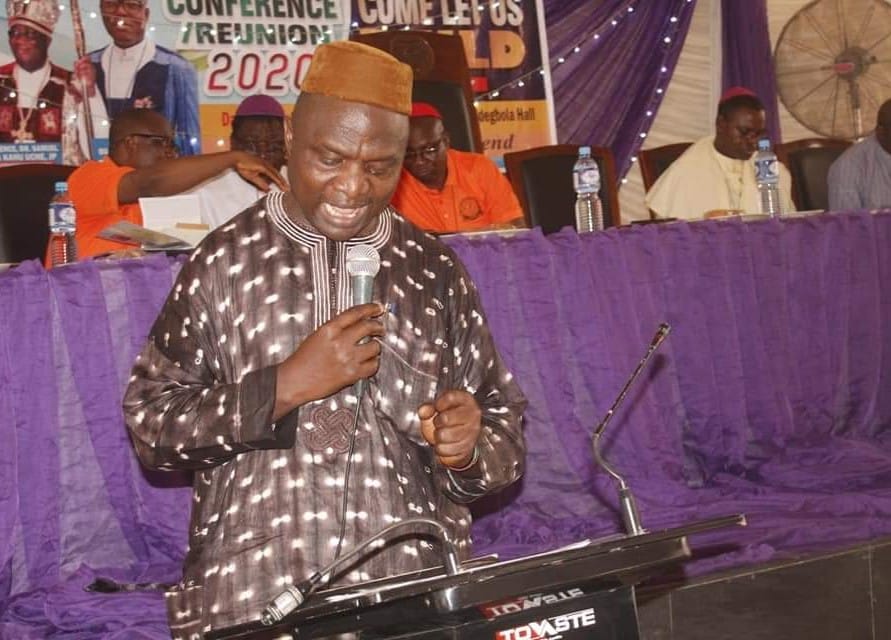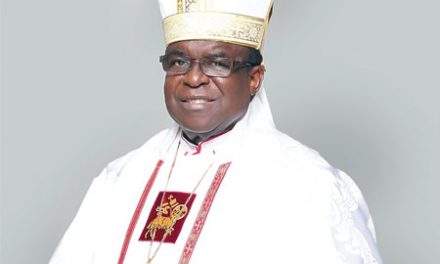A Keynote Address to mark the Methodist Theological Institute, Sagamu, Nigeria,
2020 Alumni Association Conference.
At Adeolu Adegbola Hall, MTI, Sagamu.
On Thursday 19th March, 2020.
by
Very Rev Dr Deji Okegbile
(Protocol)
Alumni Association Chairman – Most Rev (Dr) Isaac Ayobami Olawuyi
Archbishops
Bishops,
The Rector of MTI – Very Rev Dr Sunday Ola Onadipe
Chairman, Local Organising Committee – Very Rev Dr Joseph O. Odunuga
Teaching and Non Teaching Staff of MTI,
Fellow Distinguished Alumni of MTI,
All other Clergy present
Current Students of MTI,
Gentlemen of the Press,
Ladies and Gentlemen.
Introduction: Distinguished Alumni, we have come here to build together bearing in mind that the tone of the Alumni exerts profound effect on the tone of the Institute, our pulpits, and Methodism in general. What we as Alumni are passionate about will by and large be the passions of the Institute and the church, and what we neglect will likely be neglected in the Institute and in the church.
The Walls and Gates of Methodism: Nehemiah had a vision, and shared it with enthusiasm, inspiring Jerusalem’s leaders to rebuild the wall just as Papa Adeolu Adegbola had a vision for rebuilding the walls and gates of Methodism in Nigeria. Papa Adegbola with enthusiasm founded Methodist Theological Institute (MTI), Sagamu in 1951 with a vision ‘to be a world class theological institution to train God-called men and women to contribute to the transformation of the society with their God given talents.’ The mandate of this Conference to “Come, let us build” calls us, MTI Alumni to a radical renewal for the Institute in the new decade and in preparation for the MTI 70th Founder’s Day next year, the celebration of the Nigerian Methodism at 180, Methodist autonomy at 60, and election of new prelate, all in 2022.
My Keynote Theology: The theology of “Come, let us build” is missional and contradict ceremonial leadership and prosperity-driven mission practitioners. The chosen Scripture for this Conference from Nehemiah reminds us that what we get in the spirit, must be found in precept or principle in the Word of God. It’s time to reposition ourselves for the things God already said is supposed to be done in and through our mutual team work and fellowship (Neh 2:17). Using the image of the Trinity, a perichoresis, a Greek word, in term of the mutual relationship of the three persons of the triune God to one another, our Alumni Association is supposed to be a mutual relationship, a dance of love.[1] Developing over the work of Cantalamesa Raniero, what I called ‘Alumni perichoresis,’ suggests a harmonious set of relationship within the Alumni in which there is mutual giving and receiving for the common good. ‘Alumni perichoresis’ is about a lifelong mutual connection within Alumni and in partnership with the MTI management hence, we are to work and strengthen the ties that connects us as Alumni, colleagues in ministry and servants of God in Methodist Church Nigeria. The theology behind this keynote address summons us as Alumni to guide against every act and divisions that could hinder and reduce our dance of love and rebuilding of our walls and gates into a choreography of conflict and divisions.
The mission of MTI is carried out everyday through us as Alumni, an incredible global networks of faithful Christian leaders; who serve in many and different contexts locally and internationally, in churches, schools, and non-profit organisations. As Alumni and embracing our diversity of gifts and talents, we are called to serve the Institute by promoting its welfare, theological and missional heritage. Our Alumni profile from Deaconess to the Archbishop is to reflect revival and renewal to the work of theological education and missional leadership in Methodism and in Nigeria more importantly.
The Keynote Philosophy: MTI exists and was ‘established to offer a qualitative theological education, professional and vocational training for God called male and female, without discrimination of their ethnic group, linguistic, social, educational, and economic background.’ Since 1952 MTI ‘is out to train people for effective leadership in the work of the ministry of the Church so as to discover their God given talents for the fulfilment of the Great Commission committed to the Disciples of Christ.’ Today, the Methodism and society into which MTI was established 69 years ago has changed and is still changing, ‘being a materialistic society, the focus of getting more and having a life of ease have permeated the Church of the Lord Jesus and supplanted the reason for our being saved’ and training. MTI was established in the midst of the agitation for Nigerian political independence[2] and Nigerian Methodism autonomy. The Institute commenced academic activities with seven students for the training as Lay Pastoral agent as a result of Papa Adegbola’s ‘Lord of my Life’ conference across Wesleyan Methodist.
Philosophically, “Come, let us build” means moving from a position that is passive to one that is missional and dynamic in the interest of the Institute. To “Come,” calls for a change of position, a repositioning with a blueprint for the Institute and the Methodism in Nigeria. As Alumni of this great Institute, we cannot stay in the same level we are in as the vision and values of what our lives and MTI is supposed to be like begins to take precedence. I believe God is saying to us, enough of living from the perspective of comfort and ease while leaving many things that we should have been doing undone. The invitation to “Come” must change how we think, how we talk and what we do to the way God says we’re to think, talk and how we’re supposed to do it. We look for possibilities instead of excuses that cause a paralysis and negates what we have in our hearts to do.
The Need for a Repositioning Blueprint: Two thousand years ago, when Jesus declared that He would build His Church, Jesus rolled out a blueprint of what the Church was meant to be – relevant and effective through all generations. As MTI Alumni, we now find ourselves in the 21st century and we need to ask ourselves, “When we roll out the blueprint we currently have for building the walls and gates of the Institute and the church, does it look like the same as His?”[3] Do we even have a blueprint? Are we building the walls and gates of the Institute and the church Jesus wants built? Using the words of the Methodist Church Nigeria, Prelate emeritus, His Eminence Mbang, the problem of Nigerian Methodism which resonates with MTI Alumni, is not our Constitution but we members, including the Alumni. His Eminence Mbang said, “Our assignment is first to convert doubting Thomases; our problem is that we talk in one thousand tongues, but now we should talk in one tongue.”[4] Are there doubting Thomases among us? His Eminence Samuel Chukwuemeka Kanu Uche, Prelate, Methodist Church Nigeria during his sermon at the 2020 Special Conference of the church on the review of Methodist Constitution charged the delegates to conduct themselves as Christian. This is very helpful in the context of this keynote address. Using the words of His Eminence Uche, our behaviour as Christian Alumni must be counter cultural, ‘not as politicians because most of the politicians are like chameleons, who are not stable in ideology, ’ if they have one at all. [5]
Seminary Alumni are the mission brand-ambassadors of the institution they graduated from hence, as mission practitioners and church administrators, they connects their successes with what the college has provided them. Just as Alumni associations exists, MTI Alumni as responsible mission bearer to God exists to support the parent organisation’s goals, and to strengthen the tie between the Alumni, Methodism, and nation in general. In essence, a mutual relationship between the Institute and its Alumni is essential for effective rebuilding, renewal and revival.
The Power of Alumni: The power of Alumni in the development of Theological Education system, church growth and renewal is inexhaustible bearing in mind its past, representation of its present and a link to its future. Theological and Mission Education provides the bedrock for any denominations theological, leadership, vision and mission directions. In such a time when there is global erosion of our theological, moral, ethical, and missiological values, this Alumni Conference invite us to ‘play a central and dominant role in spiritual formation and denominational identity.[6] Gilpin Clark in one of his works, ‘The Theological Schools: Transmission, Transformation, and Transcendence of Denominational Culture provides further clue to the missional role and invitation to the Alumni. The understanding is that, as Alumni, we have inculcated ‘the particular configuration of beliefs, moral norms, and pattern of worship and polity that made the denomination a recognisable distinct fellowship within the larger Christian tradition.’ The missional invitation to the Alumni ‘Come, let us build,’ calls us not just for the maintenance of the structures but as ‘custodian of denominational lore’ hence, we have to contribute ‘significantly to the formation of the denomination itself, moulding corporate practices and habits of mind by providing expert interpretation of the tradition.’[7] The question is, what have become of the Alumni who graduated from MTI, Sagamu, especially in the growth and development of Methodism and theological education in Nigeria? Are we growing or declining the church and the Institute?
The power of Alumni in Theological Education and Mission beyond the combating of erosion of our theological and missiological values is to ‘decisively influence the denomination’s theological outlook, liturgical practice, or sense of social responsibility,’ and leadership in general. The question is, are we as Alumni, truly custodian of Methodist lore and how much are we contributing to the missional formation of our spiritual repositioning and provision of expert interpretation of our spirituality and tradition? Is our school environment and welfare packages stimulating and encouraging academics and mentoring or a punitive measure to a certain category of people? What can we learn from others like Asbury Seminary Alumni in the fastest growing churches in North America? How can we be MTI Alumni in Methodism as the fastest growing church in Nigeria and Africa? MTI Alumni relations/perichoresis is a strategic missional asset not only for our Institute but also for Methodist Church Nigeria to stand out not just as the first international denomination in Nigeria but for effective soul winning, relational leadership, and healthy growth.
The Missional Invitation: The theme of this Conference “Come, let us build” as a missional invitation again calls us to ‘Alumni Perichoresis,’ a united missional Alumni network for the Institute, church and leadership renewal. As a collective vision, this missional invitation calls us to physical and spiritual rebuilding that must go hand in hand suggests a repositioning blueprint for mission practitioners, academics and church administrators for 21st century. Lesson from the life of Nehemiah which resonates with that of John Wesley captures the raw essence of their characters as repositioning blueprint for the physical and spiritual revival of a nation and proper focus on God. Nehemiah rebuilt the walls and gates of Jerusalem in 52 days (6:15). Walls and gates are beyond the mud or cement concrete structures around the church or passageway/doorway into the church. Spiritually, gates were where prophets cried out and kings judges, and people met, while walls as the Divine truth proceeding from the Lord points to the truths of our faith, and in the opposite sense the falsities which we have to destroy in order to rebuild (Is 49:16, 60:18, 62:6). The walls of Methodism signifies the truths of Methodist faith, faith of our fathers, living still (Sing). Gates of Methodism suggests different levels where leaders meet and counsel given. The invitation to “Come, let is build” goes beyond the job of gatekeepers but as gospel-keepers, seeking first the kingdom of God and His righteousness.
To “Come” is really just another saying, ‘You can do it, It’s your turn, Start, Jump, Go, (Quit making excuses) (Break free of your fears) Live your faith.’ The serious matter before us at this Conference is that, many Alumni live beneath their missional potential, they live what we’ll call the safe life or ministry. To respond to Nehemiah’s call, the theme of this Conference, just as many run into someone who heard Jesus say “Come,” there is urgency for us as Alumni to go ‘over the edge of the comfortable and predictable safe zone,’ and start following Jesus in the faith zone.
To “Come” is about a change, a movement, a recovery of our missional walls and gates identities, a spiritual renewal which often begins with personal renewal. The question for this Conference is, what do we do when Nehemiah says “Come”? Unlike Peter, who physically responded to Jesus call, and got cut on the deep blue sea, ‘you and I may never literally get out of a boat and walk on top of water as Peter did.’ Therefore let us relax and reflect on how Nehemiah, Peter and others put that which was over their head under their feet. The truth before us as Alumni is that, we may ‘have no desire to walk on the water when there is a perfectly good boat anywhere nearby.’
Beyond scholarly arguments and debates,[8] other disciples had the ‘same opportunity Peter had to walk on the water, the circumstances were the same, Jesus was the same, the Word was the same.’ While some ‘chose to hold on to the boat; Peter chose to step out on the Word. When Peter stepped out on the word: He stepped into a brand new anointing. He stepped into a supernatural water walking anointing, He began moving and walking and operating in the same realm and the same anointing that Jesus was functioning in.’ Just as Peter had a word: “Come,” God is calling us as Alumni not to stay on the same faith level that we are on.
“Come, let us build” is a reposition blueprint[9] calling for personal and leadership renewal for the new decade, a physical and spiritual movement, physically leaving ‘the safety of a perfectly good boat and leap out onto a raging sea,’ raging church decline, theological and political absurdity. “Come, let us build” as a repositioning blueprint for the Alumni is a challenge to duplicate that same reckless faith and abandon that Nehemiah, Peter, and Wesleys had when they let go of everything so they could hold onto God’s Word – (Walls and Gates). This Conference calls us as gospel-keepers to ‘Come’ out of our low wall roads as gatekeepers and choose the higher wall road of walking in the light of God’s Word (Sing – When we walk with the Lord).
Brian Johnson in one of his books, ‘Healthy Churches: God’s Bible Blueprint for Growth,’ reminds us that, God has a blueprint for our growth. With reference to Paul’s prayer in First Corinthians, Johnson explained how Paul tie together two images of growth – the one of a garden with plants and the other of a building with foundation (1 Cor 3:10-15). The first rule of the building stage is to lay the foundation well hence, our early healthy church growth and development. The next stage of the building work is renewing the building quality. This is where our individual and Alumni responsibilities comes in, as we respond to the foundation teaching of Jesus Christ. The theme of this Conference, “Come, let us build” resonates with Paul’s prayer on the need and urgency to be “rooted and grounded” again in Jesus’ teachings. Dear Alumni, no tree is stronger than its root system just as no building is stronger than its foundation. Good foundations are required to support the rest of the development the way good root supplies nutrients to the branches of the tree. Alumni, as a component part of the church’s leadership and root system, what type of nutrients are we supplying and contributing to Methodism, to our corporate episcopacy, and Nigeria in general? Following Jesus’ foundation, as the Master Builder, our fathers – Thomas Birch Freeman, Soremekun, Dada, Bolaji Idowu, Adegbola, Igwe and many others developed on this good foundation[10]. The question is what and how are we building on it today? Paul, in the first chapter of his letter to the Colossae expresses what might pass as the mission statement for the Alumni, as God’s building, the Christian believers (Col 1:28, I Cor 3:9). Metaphorically, as Alumni, we are God’s building, ‘growing into a holy temple …. A dwelling place of God in the Spirit’ (Eph 2:21-22). With the building metaphor, the theme of this Conference suggests the clear expectation of growth and development.
Paul again in First Corinthians cautioned us on how to build in respond to the theme of this Conference:
To build according to God’s grace not just human power.
To build, we must personally take heed how we build on the laid foundation.
To build, no other foundation, ‘than that which is laid, which is Jesus Christ.’
To build, – with gold, silver, and precious stones – done in a spirit of cooperation and love but not with mere human wisdom and pride which promotes divisiveness and strife.
I am calling the Nehemiah in each of us and as MTI Alumni to “Come,” first with self repositioning and corporate reposition of the walls and gates of MTI and MCN that are decayed, broken, and leaving the nation in despair. What about the walls of our personal salvation, marriage, leadership commitment, and focus in eternal life? The new decade suggests a new chance and opportunity to rebuild MTI walls and gates. In the new decade, consumer Christianity and leadership that asks ‘what can I get from God or what’s in it for me’ will die and a model of selfless discipleship will emerge. In the new decade, churches and leadership that love their model than mission will die hence, ‘many individual congregation and some entire denominations won’t make it. The difference will be between those who cling to mission and those who cling to the model,’ the human structure. The invention of the car took over from the horse and buggy and human transportation exploded. In this instance, ‘the mission is the travel. The model is a buggy, or car, or motorcycle, or jet.’ Churches that embrace renewal and rebuilding around mission and leadership will always flourish just as ‘companies that show innovation around mission (Apple, Samsung) will always beat companies that remain devoted to the method (Kodak).’ Are we going to be an Apple, Samsung, Alumni or Kodak Alumni?
Personally, as an Alumni, my (building – walls and gates) mission field where I am presently is a difficult terrain and in decline.[11] In the midst of these challenges and others, I have to reposition myself as a mission practitioner and gospel-keeper. The collar must come to our villages, towns, cities, and High Streets, building God’s kingdom. The repositioning blue-print, the standard for living and mission, that is, the means to attain the Lord in all His glory remains the unchanging and eternal Word of God. To arise and build is to establish and focus on the blueprint bearing in mind that ‘what people (Alumni) become involved in becomes the mission.’
Conclusion: To “Come, let us build,” history may give us confidence, it is the Holy Spirit that gives us hope. A spiritual survey revealed the global secular invasions hence, the ruins of our orthodoxy and episcopacy just as our nations continues on a path of spiritual ruin. As our examples in Nehemiah, Wesleys, Pa Adegbola and other shows, first of all, they were serious with the Divine truth. When they saw the walls of their cities, ministries in ruin, under the leading and unction of the Holy Spirit, they made up their mind to do something about it. The walls symbolises God’s salvation. The question is how do you see the walls and gates of our orthodoxy, in ruin and broken? How do you see the walls of our theological education and corporate episcopacy, in ruin and broken? Have we substituted culture of Calvary for culture of consumerism? The reflection is that ‘whether by compulsion or by volition, the church in general in its current form lost much of the early church standing and relevance. In the new decade, the longing for authenticity by people will increase as the heart of the Gospel especially in a culture that markets everything to death.
Closing Remark: It is an honour to be asked to deliver the keynote address on this august occasion of the 2020 Alumni Conference. I hereby express my sincere appreciation to the Rector, staff, distinguished fellow Alumni, current students, and the organisers of this Conference. I pray that our Institute will continue to be a great combination of passion for God, for truth, for the church and for the perishing. I also pray for a flourishing and abounding deep understanding of God and His Word as well as a high esteem for doctrinal truth and careful interpretation in the exposition of the infallible Bible, in Jesus name, Amen.
Thank you for your attention.
[1] Cantalamesa, Raniero, Contemplating the Trinity: The Path to the Abundant Christian Life (Ijamsville, Md: The Word Among Us Press, 2007), pp. 5-11
[2] Olaniwun, Ajayi, Nigeria: Africa’s Failed Asset (Ibadan: Bookcraft, 2009), pp. xvii, xx, xxiii, 1-22, 27-34
[3] Elmes, Andy, God’s Blueprint for His Church (Portsmouth: Great Big Life Publishing, 2012), pp. 15-18
[4] Okegbile, Deji, Missional Leadership for Repositioning Nigerian Methodism (Lagos: Alet Inspirationz, 2019), p. 10
[5] His Eminence Uche, S.C.K, Sermon delivered during the Opening Eucharist Servce, Methodist Church Nigeria, Special Conferenc e 2020 at Lagos on 11th March, 2020.
[6] Okegbile, Deji, Nigerian Methodists Year of Jubilee (Oluseyi Press: Ibadan, 2012), pp. 28-29
[7] Gilpin, W Clark, ‘THe Theological Schools: Transmission, Transformation, and Transcendence of Denominational Culture,’ in Carroll, Jackson, & Roof, Wade Clark (eds), Beyond Establishment: Protestant Identity in Post-Modern Age (Louisville, KT: Westminster/John Knox Press, 1993), p. 188.
[8] Mbang, Sunday, The Bible and its Interpretation (Lagos: Designplus, 2016), pp. 53-56
[9] Williamson, Mark, A Blueprint for Revival: Lesson from the life of John Wesley; A New Biography (Milton Keynes: Authentic, 2011), pp. viii, xi,
[10] Okegbile, Missional Leadership for Repositioning Nigerian Methodism, pp. 3-6
[11] Okegbile, Deji, Stop the Funeral: Reverse Methodists Decline (London: Supertec Design, 2017), pp. 15-25











Recent Comments